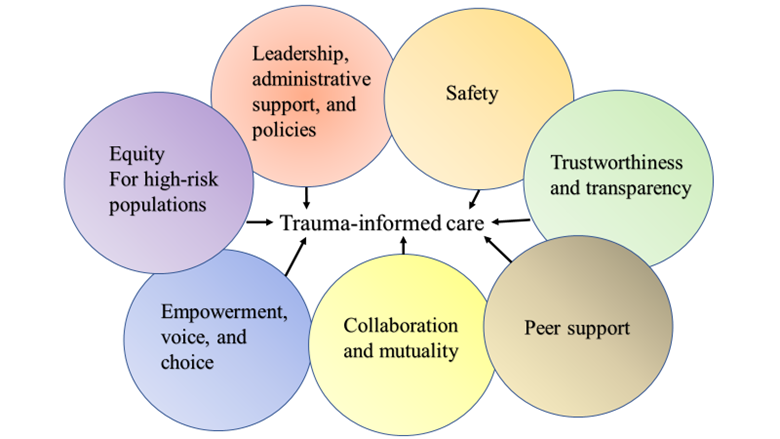Linking Systems of Care Trauma Informed Approaches
Background
Linking Systems of Care (LSOC) launched in 2014 as a demonstration project undertaken by the U.S. Office for Victims of Crime (OVC), the Montana Board of Crime Control, the University of Montana Criminology Research Group, and stakeholders from across the state. OVC called on project partners to “heal individuals, families, and communities,” “link systems of care,” and facilitate “Informed decision making.”
Trauma-informed care, with its emphasis on evidence-based decision making, coordination and collaboration, and resisting re-traumatization, squarely aligns with those directives. For this reason, the project convened the LSOC Montana Policy Workgroup, comprised of front-line service providers, state administrators from Youth Court Services and the Child and Family Services Division, judicial actors, academics, clergy, and others, to create the LSOC Montana Toolkit for Trauma-Informed Organizational Change.
Toolkit
Key components of the toolkit include:
- The LSOC Montana Organizational Trauma-Readiness Self-Assessment
- A 10-hour training curriculum available in-person or via Zoom
Created by the Policy Workgroup, the toolkit’s foundation is the LSOC Montana Trauma-Informed Policy and Practice Template. The template is rooted in academic literature and best practices for trauma-informed care, including templates from the Michigan Department of Public Health and the Maine Thrive Initiative, the Substance Abuse and Mental Health Services Administration’s (SAMHSA) Six Key Principles of Trauma-Informed Care, work from Roger Fallot and Maxine Harris, considered pioneers in the study of organizational trauma responsiveness, guidance from the Institute on Trauma and Trauma-Informed Care at the University of Buffalo School of Social Work, and reports from the field.
Seven Key Principles of Trauma-Informed Care
As articulated by the LSOC Montana Policy Workgroup, the Policy and Practice Template is guided by Seven Key Principles of Trauma-Informed Care. Those principles include:
- Adoption of trauma-informed culture that strives to ensure safety and prevent re-traumatization
- Trustworthiness and transparency
- Peer support
- Collaboration and mutuality
- Empowerment, voice, and choice
- A commitment to honoring gender equity and to furthering equity for high-risk populations, including those who are indigenous, LGBTQ+, and who have disabilities
- Ensuring that leadership, administrative support, and polices support trauma-informed care

From each of the Seven Key Principles articulated above, the Policy Workgroup identified a set of specific trauma-informed practices. Under the Key Principle of “Safety,” for instance, practices organizations may employ to be trauma informed include ensuring that spaces are well-lighted, bathroom doors lock (when safety permits), and employees have appropriate supports to manage the impacts of secondary traumatic stress. The 10-hour training curriculum articulates those practices in eight segments, one for each Key Principle and an introductory segment that defines the core concept of a trauma-informed approach.
The curriculum was developed by staff from the National Council of Juvenile and Family Court Judges, the National Child Traumatic Stress Network, and the Chadwick Center. LSOC is now working to export it across the systems of care. For more information, contact LSOC Program Coordinator Jess Mayrer at jessica.mayrer@umconnect.umt.edu.
